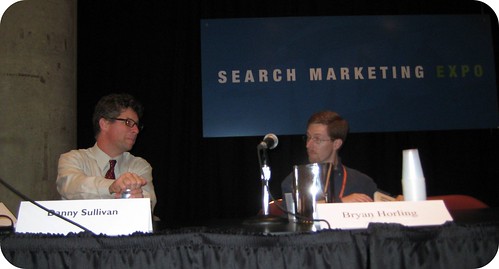Moderator: Danny Sullivan, Editor-in-Chief, Search Engine Land
Bryan Horling, Software Engineer, Personalized Search, Google is the only panelist.
He starts of with a query. He queried "dinner." The top two results are wikipedia and whatsfordinner.net. He said he is unsatisfied by these results. He then showed the personalized version of the same query and it showed recipes of foods he loves. Search is not a "one fit all" marketplace.
Why Personalized? - Get the user tot he right information as soon as possible - Many searches are inherently ambiguous - Getting the right results sometimes requires knowledge of the user or their context
He wont talk about: - Search preferences - iGoogle - Customer Search Engine - Subscribed Links - Google Desktop - etc.
History...
Early Personalization at Google: - Kaltix acquisition in 2003, which was 3 guys from Stanford. They wrote a paper on personalizing PageRank for users. - Personalized search on Google Labs in 2004, explicit (specify your interests) - Personalized search launched in 2005, implicit (based on your web history)
Google Principles: - User privacy - Transparency (inform user when things are changes) - Security - Control (allow users to delete data)
He then shows off the web history section in Google at http://www.google.com/psearch. It shows you all your search history when you were logged in. You can pause web history and you can also "remove" web history, one by one. Or you can clear your entire web history and Google wont use it to personalize your results.
Search Details: Google now shows how they personalized the results at the top right of the search page. They have a link to "more details," which explains which personalization techniques were applied. Works well.
Localization: - Using the searcher's geolocation to affect search - Different levels of granularity - Both explicit and implicit information
Country Localization: Google will use the Google local version engine i.e. Google.com versus Google.co.uk, will show different results based on the country specific engine.
Metro Localization: One step down is more specific, such as narrowing the results based on your metro area.
City Localization: Such as for searching for weather or pizza.
Personalization: - Using the searcher's personal context to rank results - Recent searches (short term) - Web history (long term)
Recent Searches: A search for jordans - most people want the shoes. But there is also a furniture store named that, so if someone searched previously for ethan allan and then immediately changed to search for jordans, it will show the furniture store. I tried it just now and it works.
Web History: Searching for galaxy will typically show astronomy related topics. But if someone often searches for soccer related topics, that person may see the soccer team.
What Does This mean for SEMs? - Half empty -- collecting metrics is harder and seeing how your pages rank is harder - Half full -- Easier for people looking for your service to find you and easier to retain customers who prefer your business. - Top position is not winner take all. - Create compelling and interesting content - Appeal to users, not engines
You can control personalization for your searches: - Use search details - Disable it by appending &pws=0 to search RUL - Sign Out - Firefox extension, greasemonkey script - Edit or turn off web history
Now we got time for Q&A...


